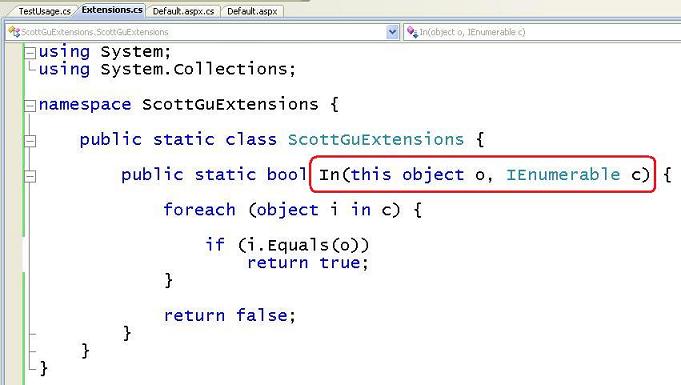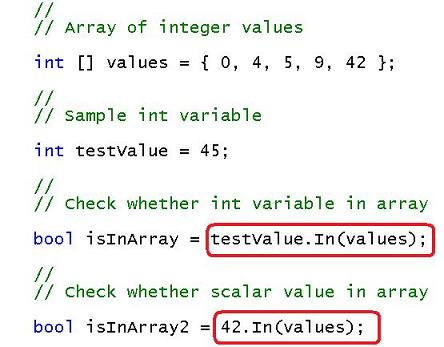c# 扩展方法奇思妙用高级篇一:改进 Scottgu 的 "In" 扩展
2009-08-08 10:49 鹤冲天 阅读(5289) 评论(9) 编辑 收藏 举报很多介绍扩展方法的也大都使用"In"作为例子,但很少有人再深入想一步。个人感觉这个In扩展的不够彻底,试看如下代码:
public static void Example1()
{
bool b1 = 1.In(new int[] { 1, 2, 3, 4, 5 });
bool b2 = "Tom".In(new string[] { "Bob", "Kitty", "Tom" });
}
//ScottGu In扩展
public static bool In(this object o, IEnumerable c)
{
foreach (object i in c)
{
if (i.Equals(o)) return true;
}
return false;
}
{
bool b1 = 1.In(new int[] { 1, 2, 3, 4, 5 });
bool b2 = "Tom".In(new string[] { "Bob", "Kitty", "Tom" });
}
//ScottGu In扩展
public static bool In(this object o, IEnumerable c)
{
foreach (object i in c)
{
if (i.Equals(o)) return true;
}
return false;
}
每次使用 In 时都要声明一个数组(或集合),有点麻烦,如果像下面这个样子调用应该比较简单一些:
public static void Example2()
{
bool b1 = 1.In(1, 2, 3, 4, 5);
bool b2 = 1.In(1, 2, 3, 4, 5, 5, 7, 8);
bool b3 = "Tom".In("Bob", "Kitty", "Tom");
bool b4 = "Tom".In("Bob", "Kitty", "Tom", "Jim");
}
感觉如何,是否有点类似SQL中的In?{
bool b1 = 1.In(1, 2, 3, 4, 5);
bool b2 = 1.In(1, 2, 3, 4, 5, 5, 7, 8);
bool b3 = "Tom".In("Bob", "Kitty", "Tom");
bool b4 = "Tom".In("Bob", "Kitty", "Tom", "Jim");
}
如何扩展的呢,很简单,这里使用了 params 这个“方法参数关键字”(MSDN中名字),还是看代码吧!
通过 params 我们不必再显式声明数组了,省了不少“笔墨”。
//ScottGu In扩展 改进
public static bool In(this object o, params object[] c)
{
foreach (object i in c)
if (i.Equals(o)) return true;
return false;
}
public static bool In(this object o, params object[] c)
{
foreach (object i in c)
if (i.Equals(o)) return true;
return false;
}
上面一直是对 object 进行扩展,但存在一个很大的隐患,你的代码可能会不注意写成以下的样子
public static void Example3()
{
string name = "Application1";
string name1 = "Bob";
string name2 = "Kitty";
string name3 = "Tom";
string s = "Tom";
bool b1 = s.In(name1, name2, name3);
bool b2 = s.In(name1, name2, name, 3);//不注意加了个小逗号
}
{
string name = "Application1";
string name1 = "Bob";
string name2 = "Kitty";
string name3 = "Tom";
string s = "Tom";
bool b1 = s.In(name1, name2, name3);
bool b2 = s.In(name1, name2, name, 3);//不注意加了个小逗号
}
编译,照样运行,出了错很难查找原因。幸好我们c#有泛型,最后改进一次:
//ScottGu In扩展 改进
public static bool In<T>(this T t, params T[] c)
{
return c.Any(i => i.Equals(t));
}
再编译,通不过了,报错如下:public static bool In<T>(this T t, params T[] c)
{
return c.Any(i => i.Equals(t));
}

问题解决了。
技术总结:我们使用 params 和 泛型改进了 ScottGu 的 In 扩展,使用调用代码更加简洁,同时也能减少编程中的误输入。
思想总结:网上好多文章都是转来转去,没有自己的想法,其它只要深入想一步,会有很多新发现。
《c#扩展方法奇思妙用》是个专题,包含很多方面的应用,请保持关注!谢谢!
-------------------
思想火花,照亮世界




